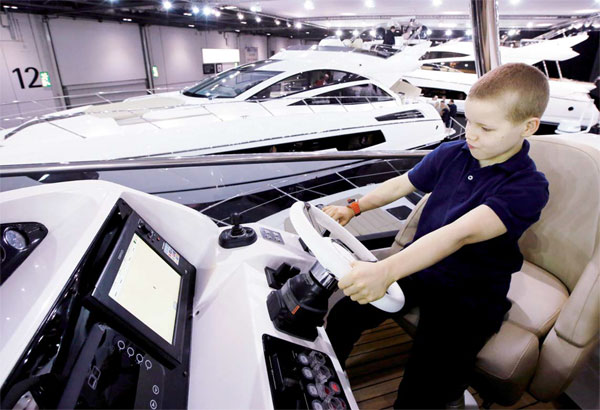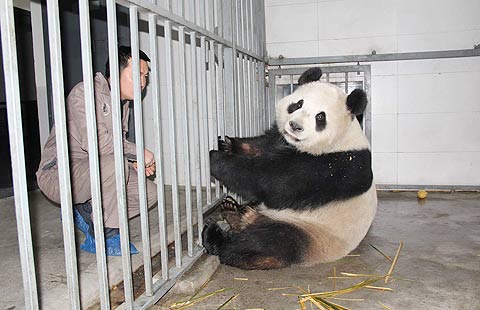Dragon tells tale of a shift in business
Updated: 2014-02-21 08:29
By Zhang Chunyan (China Daily Europe)
|
|||||||||||
|
A young visitor tests out the new Sunseeker Yacht 75 at the London Boat Show at the ExCeL centre in London on Jan 6. Dalian Wanda bought a 92 percent share of Sunseeker Yachts last year for 320 million pounds. Luke MacGregor / Reuters |
A growing number of private Chinese firms are taking the investment road to Europe
China's privately owned companies are following their state-owned and sovereign wealth fund counterparts in overseas direct investment in Europe.
"Chinese private firms almost doubled their investments in Europe from $964 million (700 million euros) to $2 billion in 2013," says Andre Loesekrug-Pietri, chairman of the Hong Kong private equity firm A Capital.
A study by A Capital is a comprehensive investigation into Chinese investment. Its Dragon Index has become the reference indicator for Chinese investments worldwide and a key index for the globalization of the Chinese economy.
While private firms are active, Chinese mergers and acquisitions in Europe fell 36 percent to $6.5 billion last year, A Capital says.
"This drop can be largely attributed to state-owned enterprises who reduced their investments from $11 billion in 2012 to $4.4 billion in 2013," Loesekrug-Pietri says.
Analysts say that early ODI was led mainly by SOEs but now more and more private firms are spearheading the investment drive.
A report published by the global consultancy firm PricewaterhouseCoopers last March also found that more and more Chinese private equity firms were shifting their focus to overseas mergers and acquisitions as opportunities to invest in China's capital market diminish.
"Though it is still early days, this shift has a big influence on deal-making between Chinese and European companies in the years ahead," the report said. "It may make the mergers and acquisitions arena even more competitive and also bring more investment opportunities to those watching out for them."
Zhou Xiaoming, minister counselor of the Chinese embassy in London, says many private Chinese companies have invested in high-end manufacturing, infrastructure, property, research and development center areas in Britain.
"Chinese investment in the UK over the past two years reached $13 billion, exceeding the total of the previous three decades," says Zhou, adding that private firms play an important role.
Among them, Dalian Wanda Group Corp Ltd, one of China's largest and most ambitious companies, plans to invest up to 3 billion pounds ($5 billion; 5.5 billion euros) in regeneration projects in Britain.
British Prime Minister David Cameron unveiled the investment after meeting Dalian Wanda's chairman Wang Jianlin at the World Economic Forum in Davos, Switzerland, last month.
Before the latest plan was announced, Dalian Wanda closed two deals last June, investing 700 million pounds to build a five-star hotel in London by the Thames, and buying a 92 percent share of Sunseeker Yachts for 320 million pounds.
In 2012 the privately owned Dalian Wanda bought the AMC cinema chain in the US for $2.5 billion. The company has extensive commercial property, hotel and entertainment assets in China and can be expected to appear in future analyses of China outbound deals as it continues to build its portfolio.
Besides the UK, Germany is one of the top choices for ODI by Chinese private companies because of its wealth of engineering talent and premium technology.
France, Italy and Switzerland, among others, are also seeing more interest from Chinese private companies in the luxury and metal industries. Green energy and commodities are of particularly strong interest.
In North America, Chinese companies are often viewed with suspicion, but in Europe, China's private firms have been largely welcomed, at a time when the continent has been plagued by recession and has been in desperate need of cash.
Loesekrug-Pietri says: "What we have noticed over the past few years is that while the US and Europe are similar in terms of industrial or services offering, more industrial or services deals have been closed in Europe, which confirms Europe's attractiveness and openness toward Chinese investments."
China's economic growth transition and the appearance of real estate bubbles may also force more private companies to invest overseas.
According to official data, the percentage of overseas investments by private enterprises has risen steadily in recent years and reached 30 percent in 2012.
Loesekrug-Pietri says that with rising costs on the domestic market, all leading Chinese companies need to go up the value chain and incorporate more added-value in their products, which can be gained through research and development, which takes time, or through mergers and acquisitions.
"Cut-throat competition in many industrial sectors in China and an increased focus on the domestic market, in particular due to weak outside demand, lead major players to improve their competitive advantages. Acquiring a leading brand, product range or technology serves this goal."
When private companies make overseas direct investments they also boost local economies and create or encourage employment. According to the biennial Euro-China Investment Report published by the Antwerp Management School in Belgium, investment from Chinese companies helped create or preserve about 100,000 jobs in Europe in 2011 and 2012, when the continent's economy was in a slump.
In January last year, there were 7,148 companies in Europe with Chinese investment that employed 123,780 people.
Chinese carmaker Geely paid 11 million pounds for 80 percent of Manganese Bronze Holdings Plc, parent of the London Taxi Co, in February last year, after buying 20 percent of the company in 2006.
Seven months after the Manganese Bronze acquisition, Geely restarted full production of London black cabs at London Taxi Co's old factory.
Following the investment by Geely, London Taxi Co has created an additional 66 engineering and technical jobs in Coventry and expanded its London operations with the recruitment of new sales personnel.
Li Shufu, the chairman of Geely Group, says: "Geely's priority will be to re-establish the manufacture, sale and servicing of new and current vehicles on broadly the same basis as existed before the business went into administration."
Zhou expects that private companies' investment in Europe will continue in coming years.
Loesekrug-Pietri says: "Europe, which remains the Western world's manufacturing hub in particular in areas like heavy industry, automotive, or chemicals, is definitely poised to have more and more Chinese ODI in the months and years to come, and when the process is well managed it can be very profitable for European firms. This is key for Chinese firms to be well accepted."
The Chinese IT giant Huawei spent $3.4 billion buying components, engineering and logistical services from Europe last year.
It has more than 7,700 employees in Europe. And the company said it plans to create at least 5,500 jobs in Europe over the next few years as it focuses on European telecoms markets.
Huawei says it expects to continue increasing spending in Europe as it steps up its collaboration with companies in the region.
"With full confidence in the future of Europe, we will continue to invest in this region," Ken Hu, Huawei's deputy chairman, said in Davos.
Tom Troubridge, chairman of PwC UK's China Business Group, signed an agreement with Chinese real estate developer ABP this month to provide a range of services to help companies from China set up in the UK.
"More and more Chinese firms are seeking a foothold in the UK and Europe," Troubridge says.
zhangchunyan@chinadaily.com.cn
(China Daily European Weekly 02/21/2014 page8)
Today's Top News
Pandas arrive in Belgium
China urges US to correct mistakes on Tibet
9 punished for spreading flu rumor
Beijing upgrades haze alert
Ukrainian parliament dismisses president
China strongly opposes Obama-Dalai meeting
Tax refunds to lure overseas tourists
Prosecutors tackle food crimes
Hot Topics
Lunar probe , China growth forecasts, Emission rules get tougher, China seen through 'colored lens', International board,
Editor's Picks

|

|

|

|

|

|






